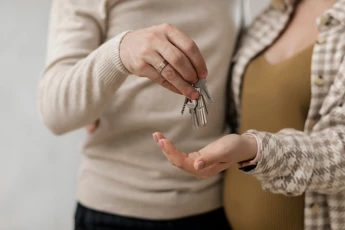 Written by: Danny Belton - Head of Lending
Written by: Danny Belton - Head of Lending
While many people think of buying a house alone, or with a spouse or partner, it’s also possible to buy a house with a friend. You could potentially unlock the door to homeownership earlier by combining incomes and deposits with a friend. In this article, we’ll discuss everything you need to think about before applying for a joint mortgage, including financial and lifestyle considerations.
In this article:
Advantages of buying a house with a friend
What are the financial considerations of a joint mortgage?
What are the lifestyle considerations of a joint mortgage?
What are the other considerations of a joint mortgage?
How much can I borrow with a joint mortgage?
Who can I get a joint mortgage with?
What is a joint mortgage?
A joint mortgage is a loan taken out by two or more people in order to buy a property. In doing this, they become co-owners and have a shared responsibility to repay the mortgage. Combining incomes and having a joint mortgage with a friend can be beneficial for many reasons, but most importantly, it can enable you to get on the property ladder sooner.
How do joint mortgages work?
Same as with a regular mortgage, you pay a deposit on a property, and take out a mortgage for the remaining portion. You can save for a deposit with the person you’re sharing the mortgage with, and you can both make monthly repayments for the mortgage together also. Each person named on the mortgage owns the property jointly, and everyone is responsible for making sure the repayments are made on time.
Advantages of buying a house with a friend
Buying a house with someone else has become more popular over recent years. As our research shows, 23% of prospective homebuyers aged 18-24 are planning to buy with a friend. This equates to around 67,500 of first time buyers per year.1
Pooling resources and sharing a mortgage with a friend can be advantageous for many reasons:
- Increase your borrowing power - by combining salaries, you may be able to afford a more desirable property.
- Put down a bigger deposit - having a larger deposit means you could benefit from lower interest rates.
- Start building equity - contributing to a mortgage every month means you’ll start to increase the amount of the home you own outright.
- Share the cost of living - having someone to split the bills with can ease the affordability challenges many are faced with when buying for the first time.
- Choose who to share it with - you get to live, and share a mortgage, with someone you like and trust.
What are the financial considerations of a joint mortgage?
Sharing a mortgage with a friend is a big investment to take on together, so it’s important to have an open and honest conversation about your financial situation before you agree to anything.
Credit checks
Both applicants who apply for a joint mortgage will undergo a credit check to see how financially reliable they are. A poor credit score from one person could affect the entire application, so if you already know that you have bad credit, you should take steps to improve your credit score before applying for the mortgage.
Also, once you have your mortgage, any problems with late payments could negatively impact your credit score, even if it’s your friend who is responsible for the missed payment.
Establish a budget
You should sit down together and decide where you want to live, and what type of house you’d like to live in. Consider things such as: your commute to work, local amenities, off-road parking, garden for pets and more.
The next thing you need to look at is both your incomes, monthly outgoings, and combined deposit amount. Once you have this established, we can give you an accurate estimate of the mortgage you can afford, using our affordability calculator.
Deposit and ownership shares
If you’re buying with one other person, you don’t necessarily have to split the cost of everything 50/50. Decide upfront on the contribution percentages for both the deposit, and ongoing mortgage payments. This will determine each person’s ownership stake in the property. Be sure to put this down in writing so if you ever sell the property, everyone gets their stakes.
What are the lifestyle considerations of a joint mortgage?
As well as considering the financial and legal aspects of buying a house with a friend, it’s important to also take the time to think about who you might want to live with and how that relationship would work.
Compatibility
Living with friends can be great, but do your lifestyles align? For instance, what are your expectations with noise levels, cleanliness etc. Living with someone can be quite different, and it’s not uncommon for this to put a strain on your friendship.
Exit plan
Considering potential scenarios is crucial when purchasing a property with a friend. What happens if one party wants to sell or needs to relocate? Having a clear exit strategy in place is therefore fundamental. This includes outlining the process for selling the property, a right of first refusal for the other party, and how to determine the property's value in case of a buyout.
Protect yourself
It’s also wise to consider which insurance policies are likely to protect you and safeguard your investment. Home and life insurance can offer added protection in unforeseen circumstances, such as the death or incapacity of one of the co-owners.
Income protection insurance can also help cover the shortfall if you’re unable to work for a period of time due to illness or injury. This would take the financial burden away from your co-owner.
Speak to a protection adviser today to ensure you're covered, should the worst happen.
What are the other considerations of a joint mortgage?
It’s crucial that you understand the legal implications of taking on a joint mortgage. There are more variants when there are two applicants sharing a mortgage, but by hiring a solicitor, they can navigate you through the legalities of buying a house with a friend, such as the tenancy agreement you chose.
Joint tenants
If you opt to be joint tenants, you will each own an equal share of the property. If one person passes away, their share of the property will be passed onto the other owner/s. If one person decides to sell the property, they would need agreement from all other owners.
Tenants in common
Tenants in common can own different shares of the property. If one person passes away, they can leave their share to a beneficiary, rather than the other owner/s. If one person decides to sell, they can do so freely and without any agreement from the others, but it is best to at least speak with them first.
Co-ownership agreement
A co-ownership agreement is a legally binding agreement that outlines ownership rights, responsibilities for maintenance and bills, and exit strategies should someone want to sell their share of the property.
Dispute resolution
This specifically refers to a process for resolving disagreements about the property or any finance-related issues.
Draw up a will
Getting a will drawn up ensures that your share of the property goes to your chosen beneficiary when you pass away. This doesn’t necessarily have to be to the other owner of the property - it can be to family or other friends.
How much can I borrow with a joint mortgage?
As with a regular mortgage, the amount you can borrow with a joint mortgage is based on several factors:
-
Joint income - Lenders will look at the combined income of all those sharing the mortgage to determine your affordability.
-
Credit score - Your credit score will influence the amount of money you may be able to secure a mortgage for.
-
Deposit amount - The larger the deposit the less you will need to borrow.
-
Interest rate - Lower interest rates can reduce your monthly repayments.
-
Mortgage term - Longer mortgage terms can allow for lower monthly payments
-
Debt-to-income ratio - Lenders will look at any debt you have, against your income, to determine your ability to repay the loan.
Who can I get a joint mortgage with?
As long as the person meets the lender’s criteria, you can get a joint mortgage with:
-
A spouse
-
A partner
-
A friend
-
A business partner
How can I apply for a joint mortgage?
Sharing a mortgage with a friend requires an extra level of attention, and a qualified mortgage adviser can guide you through all the steps involved, including:
- Assessing your combined income and outgoings to ensure you can comfortably afford the mortgage
- With access to a wider range of lenders, we can find a product that suits your circumstances and offers a competitive interest rate
Frequently Asked Questions
It is possible, but you should talk to a mortgage adviser and legal professional about the finer details.
Yes, this is possible. Read our article on the subject here.
Yes, it is possible to add someone to your mortgage without remortgaging. This is known as a ‘transfer of equity’. You’ll need to speak to a mortgage adviser to see if this is the right option for you.
Shared ownership doesn't have a one-size-fits-all income requirement. Instead, the affordability of each property depends on its value. This means the minimum income needed to rent and buy a share will vary based on the specific home you're interested in.
This is entirely dependent on your own personal circumstances. If you have a reliable and communicative relationship, and wouldn’t be able to afford a property alone, buying a property with a friend may be a solution.
A joint bank account is not legally required when getting a joint mortgage. However, if you’re a couple buying a home together, a joint bank account does make allocating funds simpler.
Important information
Your home may be repossessed if you do not keep up repayments on your mortgage.
There may be a fee for mortgage advice. The actual amount you pay will depend on your circumstances. The fee is up to 1% but a typical fee is 0.3% of the amount borrowed.
Related Articles
How do joint mortgages work?
Exploring the option of a joint mortgage is a good way to half the costs of a traditional mortgage, but is it right for you?
What is Shared Ownership?
Shared ownership is a housing arrangement that provides alternative ways to homeownership, particularly for individuals who may find it challenging alone.
Money talks: discussing finances with friends and family
Finances can be a tricky subject to bring up in conversation at the best of times - even with someone you’re close to, such as your partner or a close family member.
No posts currently available
Ready for some advice? - arrange a call back
References:




